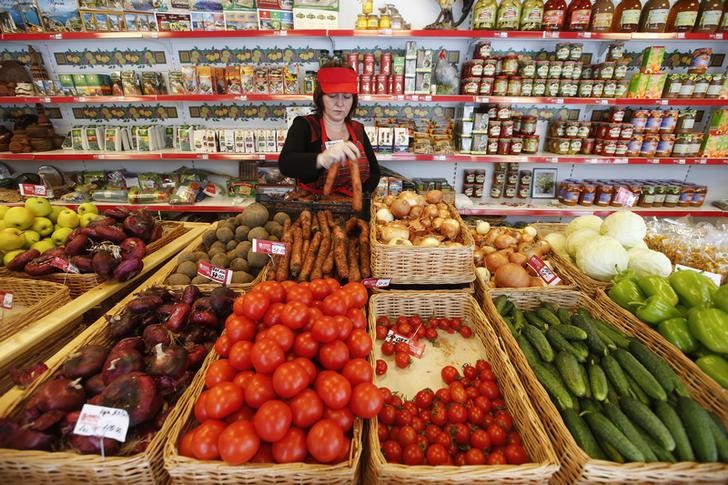* South Korea is one of the fastest-growing cheese markets in Asia
* Per-capita cheese consumption up by a third in five years
* Free trade deals help suppliers such as U.S., New Zealand
* Often combined with South Korean rice, noodle, kimchi dishes
By Meeyoung Cho and Rebecca Jang
SEOUL, Nov 11 (Reuters) - South Koreans, who traditionally eat most meals with a generous dollop of the fiery local side dish kimchi, are gaining a growing taste for another imported fermented food: cheese.
While Japan is by far the biggest consumer of cheese in Asia, neighbouring South Korea is one of the fastest-growing markets, and top suppliers such as the United States and New Zealand hope to sell even more as free trade deals cut tariffs.
Cheese demand has been helped by increased exposure to western dishes such as pizza, but South Koreans also often incorporate it into local dishes ranging from noodle soup to kimchi stir-fried rice.
"I try to sprinkle cheese even on Korean food," said Lee Mi-ji, a 31-year-old office worker, who initially started eating cheese with wine.
Cheese consumption has soared by a third in the last five years and annual imports are now worth nearly $500 million.
"People are familiar with fermented food such as kimchi, soybean and chilly paste. Cheese is also fermented. So I think they are getting used to it fast," said Hwang Keum-taek, a food and nutrition professor at Seoul National University.
As in other parts of Asia, dairy products have been less popular partly due to many South Koreans having difficulty digesting lactose, the sugar found in milk. But cheese is tolerated better as it contains less lactose.
"Cheese reduces the spicy taste in lots of Korean food. Students often put string cheese in ramen," said Se-jun Kim, a spokesman at Korea's Maeil Dairies Co Ltd 005990.KQ , referring to a type of mozzarella added to noodle soups.
South Korean cheese imports jumped 60 percent last year from 2010 to 97,000 tonnes, while Japan's imports rose 17 percent to 232,000 tonnes over the period, according to U.S. Department of Agriculture (USDA) data.
Separate data on China was not available, but Euromonitor International expects its cheese market to jump 23 percent to 3.5 billion yuan ($550.54 million) this year.
FONTERRA SEES EXPORT POTENTIAL
"Korea is still at a beginning stage in terms of product variety and consumption patterns," said a USDA report, noting consumption was dominated by processed sliced cheese and shredded mozzarella.
South Koreans are now consuming 2.4 kg per person, according to industry data, but that is only about a tenth of the cheese consumed in France.
Demand for cheese has doubled to 117,800 tonnes a year, largely met by imports, as local production has been broadly unchanged in the past decade at around 23,000 tonnes.
South Korea is now the world's fifth-biggest importer, with the United States supplying 53 percent of imports in the first nine months of this year, New Zealand 13 percent and the rest from Germany, France and others, according to customs data.
"Sales of our food service products such as mozzarella cheese are performing strongly due to growing demand from Korea's bakery, fast-food and pre-prepared meal categories," said Kelvin Wickham, Managing Director of Global Ingredients at New Zealand's Fonterra Co-Operative Group Ltd , the world's biggest dairy exporter.
Suppliers such Fonterra see increased export potential under the New Zealand-Korea free trade agreement which will see import tariffs of up to 36 percent phased out in the next decade or so.
South Korea also has free trade deals with the United States and Europe.
Yet some South Koreans have concerns about the expense and even the health implications of eating more cheese.
Lee Yu-jeong, a 41-year-old mother of three in Seoul, said she felt cheese was still expensive, costing about 5,000 Korean won ($4.32) for 10 slices of an organic variety, though she did buy some for one of her children.
"But I don't give much cheese to the other kids who are tall and big, as I am concerned if they gain weight," she added. ($1 = 6.3574 Chinese yuan renminbi) ($1 = 1,157.0000 won)
<^^^^^^^^^^^^^^^^^^^^^^^^^^^^^^^^^^^^^^^^^^^^^^^^^^^^^^^^^^^ South Korea's cheese demand and the world's top ten importers:
http://link.reuters.com/dac95w
^^^^^^^^^^^^^^^^^^^^^^^^^^^^^^^^^^^^^^^^^^^^^^^^^^^^^^^^^^^>
